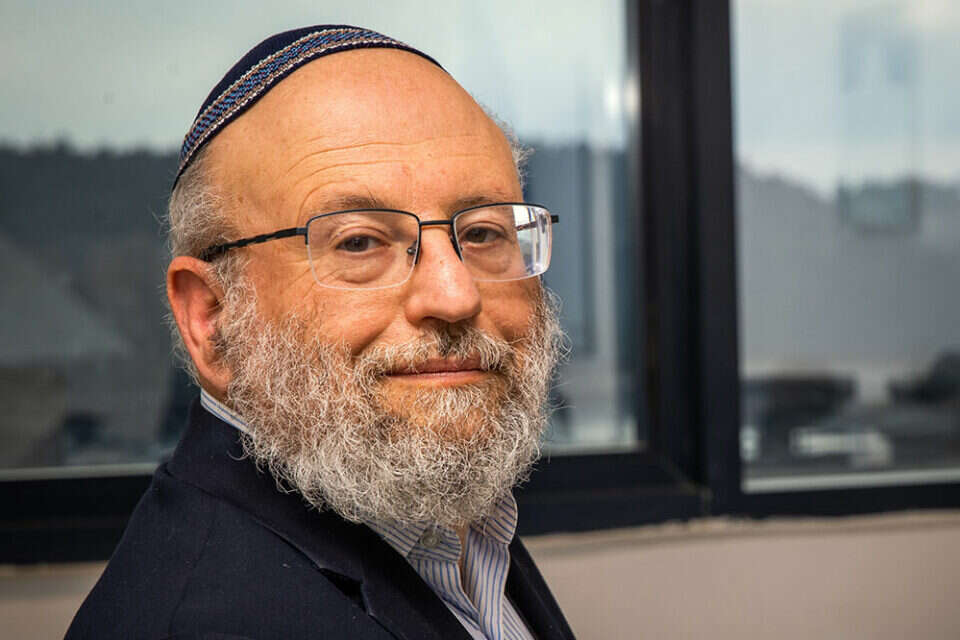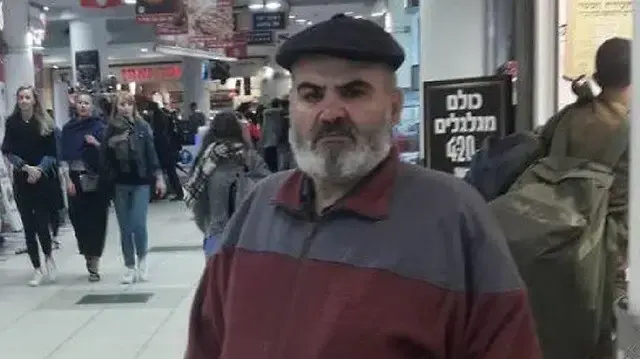When I, my wife, heard that I was going to become the head of the state conversion system, she was startled, "smiles Rabbi Benyahu Brunner." She also hears news, and she knew it was a complex thing.
The truth is that I, too, was undecided, and did not respond immediately because of the public outcry.
I'm not a man of wars, and I've never been involved in politics.
In fact, I even had a reluctance from the whole occupation.
Rabbi Chaim Druckman begged me very much, said that the head of the conversion department had finished his job, and I agreed.
Days will tell if this was the right decision. "
For about a month and a half, Rabbi Brunner (61) has held one of the most explosive positions in the field of religion and the state - the head of the state conversion system, the man in charge of all conversions in the country.
After his predecessor, Rabbi Moshe Weller, was fired because he sided with the position of Chief Rabbinate, and not with the position of Minister of Religions Matan Kahana, regarding the conversion reform, Rabbi Brunner took on the role - which literally divides the Minister of Religions from one Crimson.
The executioner, who is in the middle of the chaos and who is supposed to bring thousands of Israeli residents into the Jewish religion.
First, a little order in the mess: already in the coalition agreements, the Minister of Religions undertook to expand the state conversion system, and to allow the city rabbis to establish courts parallel to the state ones that exist today.
This, in order to convert some of the nearly half a million non-Jewish Israelis, most of them immigrants from the former USSR and their descendants, many of whom were born in Israel and see themselves as Jews in every way.
Last December, the details of the outline were revealed in "Israel Today", in the framework of which each mayor will be able to establish his own conversion beneficiary within the existing system.
According to the outline, a state law was approved at the beginning of the week in the Ministerial Committee on Legislative Affairs, which in fact marches it in large steps to the Israeli law book.
Those who are angry about the reform are the chief rabbis, who declared at a conference attended by 1,000 rabbis who would refuse to recognize such conversions, and who threatened that the conversion of thousands of unintentional people would necessitate the opening of genealogies - and in fact create Jewish and non-Jewish classes within Israel.
Rabbi Lau, Photo: Oren Ben Hakon
The ultra-Orthodox and religious MKs are also fighting for reform with all their might, declaring that they intend to repeal it when they return to power. .
On the door of Rabbi Brunner's room is still the name of his predecessor in office, a sign of the short time that has passed since he was appointed to the position.
In answer to the obvious question about the load and pressure placed on him he smiles, completely relaxed: "I am in a whirlpool, and there is a danger of drowning."
It is impossible to ignore the fact that your predecessor in office, Rabbi Weller, was resoundingly dismissed.
Did you feel comfortable getting into his shoes?
"The rabbi and I are good friends, and we had very good collaborations. When I was offered the job, I knew full well that he would not continue. If there was any thought that I was the one who washes him away - I would not come. Unequivocally. In fact, Rabbi Weller and I are in touch today .
"Existence is built on solidarity"
This is the first time that Rabbi Brunner has served in such a senior and explosive position in the civil service.
Prior to that, he had more than 30 years of activity in the city of Safed, where he arrived in 1989 as a young rabbi, after many years of study at the Merkaz Harav yeshiva in Jerusalem and at the Bnei David Psagot Institute, where he studied law.
"I was offered to come to the city and set up a kollel for the students. I told my wife that if I wanted to set up the kollel I had to move there. We came for a year, and we stayed for 33 years."
A decade after the opening of the kollel, he established the Hesder Yeshiva in Safed and headed it for another decade, after which he served as a community rabbi in Kiryat Ata for two years.
His last position, as rabbi of the Safed Academic College, he began about eight years ago, and at the same time he served as the head of the Rabbinical Court for Conversion in the city of Haifa.
He holds a PhD in Biblical Studies from the University of Haifa, and is a lecturer at Safed College in the field. He also gives lectures in history. He has eight children - seven sons and a daughter. "The boys all served as combatants in the IDF," says the proud father.
Chief Rabbinate, Photo: Dudi Vaknin
On the day Rabbi Brunner was appointed to the post, he revealed how controversial his appointment was, when Chief Rabbi David Lau announced in an official letter to the Minister of Religions in response that he would not accept the conversions of the new head of the array, but would serve in the post himself.
"The president of the tribunal announces that he will use his legal authority, and will assume all the duties and powers in the conversion system, so that in fact the appointment of the head of the conversion system is uprooted," the chief rabbi's secretary announced to Minister Kahana.
Are you offended by Rabbi Lau's letter?
"I was not harmed, because I understand that it is not personal. Rabbi Lau knows me well. Pain of a conversion court, the rabbi approved all my conversions. There was never a problem. The chief rabbis were in good contact with me, even though they knew my opinions. It is no secret. That I was a member of the Tzohar council over the years. "
Have you been meeting with him since your appointment?
"No. I asked for a meeting with him and it has not yet come out."
The fact that the president of the Great Rabbinical Court has not met with the head of the new formation for a month and a half sends a very clear message - he does not want to meet with you.
"I understand there are delays. I believe it will happen eventually."
It is not easy to be the man whose job it is to go against the Chief Rabbinate.
"I am not against the chief rabbinate, on the contrary. I am a man of the chief rabbinate, and felt like an emissary of the rabbinate. I agreed to the position because I believed that my choice was the best - not as an outsider, but a conversion court pain. To be accepted by the rabbinate.
"I have been in good contact with all the chief rabbis for their generations, and in fact - Rabbi Israel Meir Lau is the one who appointed me to my first position in the field of conversion. If it is up to me, I will make every effort to connect the parties.
Minister Matan Kahana, Photo: Arik Sultan
"Although the rabbinate is not yet in the new moves, I think that at some point they will be able to bridge the gaps and reach agreements. The IDF conversions also had objections in the original.
I believe that after things get tough, the opponents will join them.
I also have good relations with those who oppose the law.
I believe that Rabbi Shmuel Eliyahu, for example, appreciates me despite the disagreements.
After I made the decision regarding the position, I called him.
He told me I was getting into a complicated story, but did not tell me not to.
We must learn to join hands.
The existence of the State of Israel is built on the fact that we still have a platform of solidarity and understanding that we are in the same boat, despite all the public noise.
"When I was studying at the Merkaz Harav yeshiva, I met Nechama Leibowitz, and she told a midrash about Reuven and Shimon in the Red Sea, who said that the Red Sea also has clay like in Egypt. We are in the greatest miracle in history, and there is no difference between exile and redemption. , But I have a feeling God put me in this story to try to move something.
I am well connected to the religious and ultra-Orthodox public, and I have close friends from the academy who are secular.
In fact, at Safed College I have non-Jewish friends, members of minorities who have great respect for rabbis. "
Did you receive threats following your appointment to this position?
"The vast majority of the people I've been in contact with congratulated me on the appointment in very warm words. They think I'm best suited for the job. But yes, there were people who were not enthusiastic, not even very, very enthusiastic, but it was not at the level of a frontal clash."
Political opposition to Tzohar
The conversion courts have for many years received very negative criticism from the candidates for conversion.
They say that they feel that it is very difficult for them, that they are burdened with demands that make them leave the process in the middle, and that they are generally not seen as human beings who want to join the Jewish people.
"The conversion process is not a simple process, because people are supposed to change their lifestyle significantly. It is daunting," says Rabbi Brunner.
"There is no perfect system, but I think most judges do their job faithfully. The judges all know that they were appointed to convert people, not to reject someone, and if they reject someone - it is for the purpose of improving things.
"We have almost no such thing as a closed file, because the goal is always for the candidates to come back, but there are people who are not suitable for them and they retire. True, people have to spend a year studying seriously, and once there are requirements - it already creates antagonism. People think one morning can come "Convert and come out with a conversion certificate, but it does not work that way."
Will the new law address issues?
Will masses of non-Jewish Israelis flock to the conversion courts?
"The law expands the conversion system and makes it accessible to the general public. We believe that once there are conversion beneficiaries in the cities there will be more ability to convert. We need to relax. from above.
"This law should have been made more than 70 years ago. The reason for the opposition is, among other things, that the law comes from a complex government, and there are ultra-Orthodox and religious parties that are not in it. I try to calm down, but people are unfamiliar with the law "That the Minister of Religions is acting in a real way, for heaven's sake. It is possible and necessary to argue, but not to harm a person personally. He is being wronged."
Opponents of the law argue that they will allow people who do not receive the yoke of commandment to convert.
Large percentages of immigrants from the USSR definitely want this. Is there any truth to this?
Halacha is Halacha, and it will not change. Accepting the yoke of mitzvos is one of the most basic things in Judaism. We know that a person can leave the court when we are convinced that he is committed to all mitzvos wholeheartedly, and in life itself he will have ups and downs, but there is no such thing as conversion without accepting yoke Commandments".
And what about converting minors?
This is a controversial procedure, in which children are converted.
At present the Chief Rabbinate strongly opposes such conversions.
"To a certain extent, it is easier to convert minors, because the minor does not take on the yoke of Torah and mitzvos, but has to make sure that he is educated in this way through the school and the home. It should be said, minors are the next generation. Halachic whether to convert minors when their parents do not convert, and I would give that to the discretion of the tribunal.
"Personally, I would work more individually - each case on its own. There are, for example, thousands of non-Jewish children in the religious education system, and I think that greatly promotes the matter - because there is a statement here from the parents who sent them to such an institution. A large part of the potential converts are children - more than 100,000 needy converts. If we do not address this, there will be more and more intermarriage here.
"The issue of conversion is an existential threat to me, not a privilege. The State of Israel knows how to deal well with external enemies, and we have proven this time and time again, but internal problems are more dangerous. When there is an external threat we unite, We must address this issue. "
Opponents of the reform argue that the whole purpose of this reform is to allow Rabbi David Stav to open a conversion court.
For years you were a member of the Tzohar Council, and even served as the head of the marriage venture, which was exceptionally successful.
Do you feel comfortable with the anti-noon attack?
"Tzohar is an important organization that has improved the rabbinate on the issue of marriage. I do not agree with the organization in everything, and I am not involved in everything, but there is no doubt that Tzohar helps implement halakhah in Israeli society. There should be cooperation between Tzohar and the rabbinate "In my opinion, the opposition to the organization on the ultra-Orthodox side is in politics, not among the sector. When I was the head of the marriage project, I would bring ultra-Orthodox judges to lecture, and there was no problem, but when it comes to interests and politics - everything takes on a different dimension."
Many well-known rabbis in the ultra-Orthodox sector refuse to call Rabbi Autumn the title "Rabbi."
"It is very disturbing. Rabbi Satyu is an extremely smart student, and we have been friends for many years. In fact, we have studied jurisprudence and rabbinate together. When you omit someone's title, you underestimate him. You can argue, you can and should disagree, but respect for the rabbi is a basic thing."
Do you have a red line that you will not cross?
"On the personal side, if I see, God forbid, that I do not move anything and that I deal with things that are not related to me - I will leave, and it is clear that I will do so if they put me, in theory, into a confrontation I do not want. "But I do not see such a construction."
Were we wrong?
Fixed!
If you found an error in the article, we'll be happy for you to share it with us














